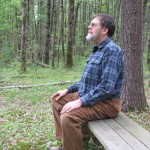 They probably should never let Pagans own Bibles, much less read them. (Too late now.)
They probably should never let Pagans own Bibles, much less read them. (Too late now.)
I’m up to Job. Though this post is going to be more inspired by an excerpt from Archibald MacLeish’s play J.B., based on Job, than by the Biblical text itself. Bear with me.
Job is probably the central book of the Bible for Pagans, whether we’ve read it or not. However monotheists might come to terms with it, Job cannot satisfy the polytheistic Pagan mind.
Job, of course, is the story of the long suffering and faithful man whose trust in God is put to the test by God–and thereby, indirectly, the omnipotent, omniscient God himself is tested. And (theoretically) vindicated. Theodicy: “The vindication of divine goodness and providence in view of the existence of evil,” says my Oxford American Dictionary, though “suffering” is probably a better word, to my mind, than “evil”.
The intellectual problem, as Archibald MacLeish had his version of Satan put it, is that
If God is God, He is not good;
If God is good, He is not God.
This morning I didn’t even know the word, theodicy. Now I know that this idea is what drove me away from monotheism when I was still a young child, walking alone in the woods for spiritual sustenance. Even as a girl, the idea of an all-powerful, all-good, all-loving, and all-knowing supreme being had holes in it I could have driven a truck through, if only my feet had reached the pedals.
And, after years of struggle to find a way to relate to the numen of the world, in a society that recognized only omnipotent monotheism as a legitimate religious possibility, I finally encountered Pagan expressions of love for the sacred, and a way forward. I found a way to embrace the gods–not omnipotent, not omniscient, and not moral absolutes of goodness, either; rather, beings that are good as existence is good, as a waterfall or a rock or a star is good.
Nora, Peter’s grandmother, was a lifelong Protestant who lived with us both for years. Whenever she heard us explain that we found the divine within nature, she would quote Tennyson, and remind us that “nature is red in tooth and claw.”
Yes. Nature is red in tooth and claw. The hawk destroys the mouse; the virus kills its host; all things die.
And yet, all things have life, have Spirit, have a rightness and a sacrality in their being. The virus that may take my life one day is no less entitled to its share of life and existence than am I; the greatest galaxy no more a miracle than the volvox swimming in my pond. I can honor them all, rejoice in them all, even as I do not abandon the importance of my own small life in all this sea of being.
existence than am I; the greatest galaxy no more a miracle than the volvox swimming in my pond. I can honor them all, rejoice in them all, even as I do not abandon the importance of my own small life in all this sea of being.
I do not see any individual god or goddess as a personified, purposeful author of this, apart from and in control. When I refer to God in this blog, I am thinking, not of an individual intelligence, with or without a long white robe and beard, but of a glowing coal of Life, of Joy, deep within the heart of all things. (Talking about the Light, or the Ain Soph, or the Ground of All Being, is a more accurate reflection of what I understand by the word “God,” and sometimes I’ll use those words, for accuracy’s sake. But it has recently come to seem cumbersome and even a bit overly precious to do that, so I’ve given myself permission to be inconsistent.)
But I don’t recognize a single, separate, all-powerful being.
So I don’t have to face the problem of Job in my theology. Instead, I think of my Pagan friend Roxanne, who, when faced with the cancer death of a member of her family, reflected that “the only thing worse than the idea that this death has no purpose would be the idea that it did.”
I could never forgive a God who deliberately inflicted suffering in order to produce a particular outcome. I could never love an all-powerful intelligence that moved us around on a chess board in such a fashion.
But I don’t have to. My God is not outside of creation, but within it, and part of it. I will die and I will suffer, not for a reason outside myself, but because it is my nature, part and parcel of being who I am: of being at all.
Death and suffering are what it costs, but not to please an arbitrary and omniscient God beyond the world. Death and suffering are what it costs to live at all. I will die because I live. I will suffer because I feel. I do not need a rationale to make this better.
And here’s the MacLeish passage that blew me away, and made my heart stop for a moment in awe:
J.B., the Job character, has lost everything, as in the Bible story. But unlike in the Bible story, the moment of acceptance and relief comes, not from a God who restores lost wealth and (unpardonably) lost children with more of the same, but from his wife (named Sarah in the play):
Sarah: You wanted justice, didn’t you?
There isn’t any. There’s the world…
Cry for justice and the stars Will stare until your eyes sting. Weep,
Enormous winds will thrash the water.
Cry in sleep for your lost children,
Snow will fall…
Snow will fall…J.B: Why did you leave me alone?
Sarah: I loved you.
I couldn’t help you any more.
You wanted justice and there was none–
Only love.
This seems deeply true to me, and beautiful. “You wanted justice and there was none–only love.”
The passage concludes with J.B. remarking, “He does not love. He Is,” and his wife replying, “But we do. That’s the wonder.”
And there I differ from MacLeish. For me, Sarah is speaking for God, for Spirit, in her love.
I recognize this love, because I have experienced it when I have stood within the warm embrace of the gods of nature, and felt their love. And I recognize it because I have bathed in the limitless sea of love that is the Light of Friends, and I know that, personal or not, individual intelligence as I, a human, can understand it or not, there is love at the heart of things.
I find that the dilemma J.B.’s Satan expresses, that the word theodicy was coined to address, does not bring me anguish any more.
I find that I can do without justice, having let go of the notion of an omnipotent puppet-master deity, separate from creation. I can let go of needing to see “justice” in a world where death is just how life is fed…
Because I have learned that I need not do without the love; that that love, that Light, is there at the heart of all things: the hawk, the mouse, the virus, the stars, and the tiniest beings in the most ordinary places.
It is enough. Mine is a God who Is–and who loves.















